|
De Zuidkoreaanse schrijver Yi Mun-yol werd geboren op 18 mei 1948 in Yongyang. Zie ook alle tags voor Yi Mun-yol op dit blog.
Uit:The Poet (Vertaald doorBrother Anthony en Chung Chong-hwa)
“Perhaps we ought to begin this investigation into the deviations of his life by evoking the problem of human memory. In his later years, summing up the whole course of his existence in a long lyric, he wrote the following lines:
As my hair grew longer,
my fortunes travelled a rough road:
he family line in ruins
the blue sea a mulberry grove.
Later readers have not usually considered those lines to be the transposition into poetry of any actual experience. At most they have assumed that they were inspired by some childhood event he learned about in his adult years, a pseudo-memory as it were, an analogy fabricated to harmonize with the assumed course of his life's history.
Such theories may satisfy those who prefer an entertaining folk-tale to the actual details of a man's real life. For them, it is unthinkable that he might have retained any actual memories of his family or origins before that fateful moment, so often chronicled, when he won first prize in a rural poetry-contest at the age of nineteen. That way the legend could be given a dramatic and really effective starting-point.
Unfortunately, the realities of life rarely if ever correspond to the demands of such fabulations. Generally received opinion notwithstanding, his memory actually stretched much further back into the past than is normally the case.
In particular, even when his life was almost done, at the end when he was weary and alone, he could recall the events of a certain evening late in the year in which he turned four as vividly as if they were just then happening before his eyes: that fateful night when his life was fundamentally transformed, as if the blue sea had indeed suddenly been turned into a mulberry grove.
He was only a child, of course, but during the last few days he had become vaguely aware of an extraordinary atmosphere brooding over the house.
The servants who had until then filled their home with a constant presence seemed visibly to have diminished in number, while those who remained no longer worked but stood in corners endlessly whispering together about something.”
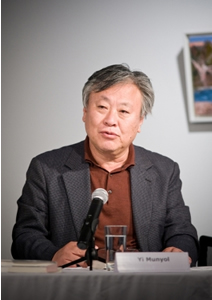
Yi Mun-yol (Yongyang, 18 mei 1948)
De Duitse dichter en schrijver Markus Breidenich werd geboren in Düren op 18 mei 1972. Zie ook alle tags voor Markus Breidenich op dit blog.
Lesung der Briefe
Ich selbst halte Rechnungen in Händen
(was ich ausgegeben habe, das habe ich
ausgegeben). Meinen weißen Tauben
stecke ich Geld in den Schnabel und
bitte sie, Stillschweigen zu bewahren
über mich. Während des Flugs schalte
ich mein Handy aus und bewege mich
kaum. Die Tiere landen am späten
Nachmittag, wenn die Sonne hinter
den Bäumen verschwindet. Die meisten
legen das Geld unter die Fußmatte der
Eingangstür und sind abends zurück.
Manche von ihnen tragen Zweige in ihren
Schnäbeln. Die Zeichen stehen auf Land.
Aus Bronzezeiten
Oft bin ich unsichtbar, und du weißt nicht,
was es bedeutet, den Schneewolken seine
Aufwartung zu machen. Sie sind mit dem
Einbalsamieren der Felder beschäftigt.
Leinentücher gehören in ihren Besitz. Die
Haut streift bei jeder Gelegenheit über
Eiskristalle und glättet sich leicht. Wo
Hände erfrieren, bleibt dunkles Gewebe
zurück, das im Innern von Gletschern
verschwindet. Meine Waffen sind stumpf,
das Fell über dem Rücken ist abgetragen.
Du kannst der Lage meiner Arme etwas
Gleichgültiges entnehmen, und der Sprache
der Höhenwinde meine Autobiografie. Ich bin
der Stummzeuge meiner Gegenwart. Du findest
mich oft bei den Steingärten über den Wiesen.
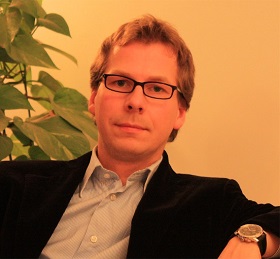
Markus Breidenich (Düren, 18 mei 1972)
De Duitse schrijver W.G. Sebald werd geboren in Wertach (Allgäu) op 18 mei 1944. Zie ook alle tags voor W. G. Sebald op dit blog.
Uit: Austerlitz (Vertaald door Anthea Bell)
“He had gone on and on down the corridors, said Austerlitz, sometimes turning left and then right again, then walling straight ahead and passing through many tall doorways, and once or twice he had climbed flights of creaking wooden stairs which gave the impression of being temporary structures, branching off from the main corridors here and there and leading half a story up or down, only to end in dark cul-desacs with roll-top cupboards, lecterns, writing desks, office chairs, and other items of furniture stacked up at the end of them, as if someone had been obliged to hold out there in a state of siege. He had even heard, said Austerlitz, of people who, over the years, had managed to start up a small business in one or other of the empty rooms and remote corridors of that great warren: a tobacconist's, a bookie's, a bar, and it was rumored, Austerlitz added, that a man called Achterbos had once turned a gentlemen's lavatory down in the basement into a public convenience for, among others, passersby in the street, installing himself at the entrance with a small table and a plate to take the money, and that later, when he engaged an assistant who was handy with a comb and a pair of scissors, it was a barber's shop for a while.
I heard several such apocryphal stories from Austerlitz, anecdotes in curious contrast to his usual rigorous objectivity, not only that day but on our later encounters, for instance one quiet November afternoon when we spent some time sitting in a cafe with a billiards room in Terneuzen-I still remember the proprietress, a woman with thick-lensed spectacles who was knitting a grassgreen sock, the glowing nuggets of coke in the hearth, the damp sawdust on the floor, the bitter smell of chicory-and looked out through the panoramic window, which was framed by the tentacles of an ancient rubber plant, at the vast expanse of the misty gray mouth of the Schelde”.
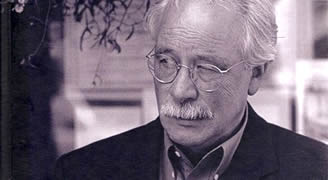
W.G. Sebald (18 mei 1944 – 14 december 2001)
De Franse schrijver François Nourissier werd geboren op 18 mei 1927 in Parijs. Zie ook alle tags voor François Nourissier op dit blog.
Uit: Le gardien des ruines
« Un carrefour, dans la lumière du matin, à Paris, en France, à l'automne de l'année, à l'automne du siècle, à l'automne d'une vie, — pas de quoi pavoiser. Fargeau se hâte. Est-il en retard?? Il n'a rien à faire, aucune obligation, aucun rendez-vous mais il se complait dans une impatience furieuse?: elle lui permet d'invectiver contre les lents et les calmes qui croisent son chemin. Pour l'instant il crispe la main sur le levier des vitesses de sa voiture, immobilisée au feu rouge qui bloque la circulation de la rue Chardon-Lagache, là où elle se jette dans l'avenue de Versailles. Déjà il anticipe les deux ou trois coups de volant indispensables pour dépasser la fourgonnette qu'il serre de près, traverser au large le carrefour et se faufiler dans la rue Le Marois avant que cet autre feu, là -bas, inutile, ne l'arrête. Il arrive ici que des gêneurs surgissent de l'une ou l'autre des six rues entrecroisées qu'on aperçoit dans le fouillis des constructions anarchiques, des vitrines tape- à -l'œil, des terre-pleins placés comme au hasard. Où que se porte le regard il ne découvre rien que de laid. On ne saurait se croire ailleurs. Ce sud du XVIe arrondissement est un faubourg, un avant-goût de banlieue. Personne ne regarde jamais rien. Si l'on voyait le décor où l'on vit on ne se lèverait pas le matin. »
Au vert, la Peugeot bondit, contourne la fourgonnette hésitante et fonce. Le feu passe à l'orange à l'instant o ù une silhouette se profile, que Fargeau remarque à peine, empêcheuse de filer droit qui pose le pied sur la chaussée et s'avance, tassée, tête baissée, comme on tombe. Fargeau crie, freine et il a le temps de voir trébucher un pot-?-tabac enveloppé de guenilles, une tête grise et jaune sous un fichu. Le choc est faible. Ce sont les hurlements, dehors, et le crissement des freins qui donnent le sentiment d'un drame. Voilà Fargeau dehors, et le premier à? s'agenouiller près du corps allongé: les témoins s'indignent, mais pour un empire ils ne toucheraient pas ? ce tas de vêtements qui gémit. Il s'agit d'une vieille femme asiatique, incroyablement vilaine et ridée, qui cherche ? se relever, souffle, se débat. »
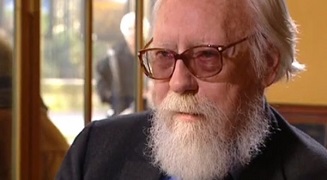
François Nourissier (18 mei 1927 – 15 februari 2011)
De IJslandse dichter en schrijver Gunnar Gunnarsson werd geboren op 18 mei 1889 in Fljótsdalur. Zie ook alle tags voor Gunnar Gunnarsson op dit blog.
Uit:Father And Son (Vertaald door Peter Foote)
“Whenever the weather was fit, they put off in their boat but often rowed back empty-handed or with one skinny flat-fish in the bottom.
This did not affect their outlook. They never complained; they bore their burden of distress, heavy as it was, with the same even temper as they showed in the face of good fortune on the rare occasions it smiled on them; in this, as in everything else, they were in harmony. For them there was always comfort enough in the hope that, if they ate nothing today, God would send them a meal tomorrow—or the next day. The advancing spring found them pale and hollow-cheeked, plagued by bad dreams, so that night after night they lay awake together.--And one such spring, a spring moreover that had been colder and stormier than usual, with hardly a single day of decent weather, evil chance paid another visit to old Snjolfur's home.
Early one morning a snow-slip landed on the cabin on the Point, burying both father and son. By some inexplicable means little Snjolfur managed to scratch his way out of the drift. As soon as he realised that for all his efforts he could not dig his father out single-handed, he raced off to the village and got people out of their beds. Help came too late--the old man was suffocated when they finally reached him through the snow.”
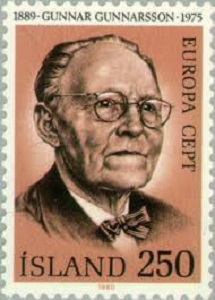
Gunnar Gunnarsson (18 mei 1889 – 21 november 1975)
Zie voor nog meer schrijvers van de 17e mei ook mijn vorige blog van vandaag.
|



